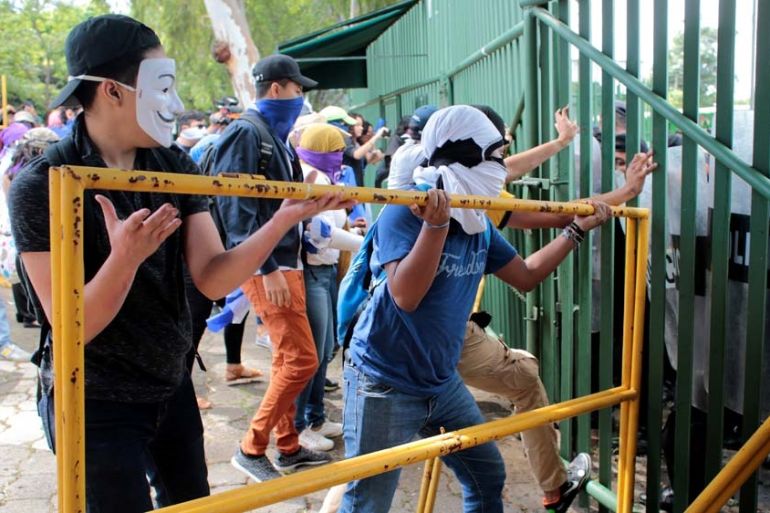Cathedral siege ends as UN urges Nicaragua to end repression
Protesters in Managua able to leave a day after government supporters break into building in a bid to dislodge them.

The United Nations has called on Nicaraguan President Daniel Ortega to halt persistent repression, as a standoff between opposition protesters staging a hunger strike inside a cathedral in the capital and pro-government supporters ended.
The activists, who were demanding the release of political prisoners, were able on Tuesday to leave the building in Managua where they had taken refuge after the government dislodged its supporters from the surroundings.
Keep reading
list of 2 itemsNicaragua revolution: Divisions continue after 40 years
Their exit came after a group of Ortega supporters broke into the cathedral on Monday and attempted to eject the protesters. In the process, they injured a priest and a nun.
“We had a bad, bad, bad time,” one of the protesters, Janeth Chavarria, told reporters after she and the other eight hunger strikers were evacuated by the Nicaraguan Red Cross.
Hunger strikes
The hunger strike at Managua’s cathedral started on Monday, four days after another group of 11 women began a similar protest at a church in the northern city of Masaya.
Both hunger strikes were part of an intensifying campaign for the release of 139 opposition protesters arrested during deadly anti-government protests that rocked Nicaragua last year.
In Mayasa, the Church of San Miguel remains under siege by the police preventing any access to the 11 hunger strikers inside, leaving them without water or electricity, according to the opposition.
Opposition groups said at least 16 churches had been “besieged by police and government forces” in recent days to prevent them being used as protest venues.
The UN human rights office on Tuesday voiced alarm at the harsh tactics used against the protesters.
“The government must end the persistent repression of dissent and the ongoing pattern of arbitrary arrests,” spokesman Rupert Colville told reporters in Geneva.
He also called on the government to “refrain from criminalising and attacking human rights defenders, political opponents and any other dissenting voices”.
|
|
The Catholic Church has a powerful role in the country but Ortega has accused bishops of being “coup plotters” for supporting the protesters.
Vice President Rosario Murillo said in a statement on Tuesday that Nicaragua “does not live in times of fierce capitalism, but in times of equity”.
“We all have rights and we are all God’s people … and we all deserve respect … from those who claim to have [religious] authority,” added Murillo, who is married to Ortega.
The unrest in Nicaragua started in April 2018 over a since-scrapped social security reform proposal. But the government’s response, which a UN report in August last year said included extrajudicial killings, arbitrary detentions and torture, ignited further discontent and protests spiralled into a broader movement against Ortega’s rule.
State repression has been blamed for at least 325 deaths in last year’s unrest, with an estimated 70,000 people forced to flee the country, according to the Inter-American Commission for Human Rights, which has condemned the violence.
The Organization of American States also released a report on Tuesday saying Nicaragua was experiencing a “critical human rights situation” that had upset the country’s constitutional order.
It said Nicaragua needed institutional reforms as a step toward carrying out transparent, free and fair elections.